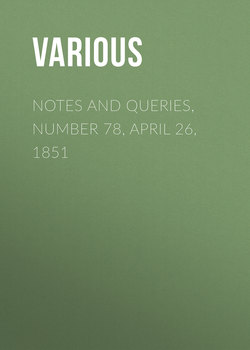Читать книгу Notes and Queries, Number 78, April 26, 1851 - Various - Страница 5
Notes
ILLUSTRATIONS OF TENNYSON
ОглавлениеThat great poets are sometimes obscure, needs no proof. That the greatest poets will necessarily be so to the ordinary reader, seems to me equally indisputable.
Not without effort can one enter into the spontaneous thought of another, or even of himself in another mood. How much more when that other is distinguished from his fellows by the greatness and singularity of his thoughts, and by the extreme subtilty of their connecting links. Obscurity is not a blemish but an excellence, if the pains of seeking are more than compensated by the pleasures of finding, the luxury of μαθησις, where the concentrated energy of a passage, when once understood, gives it a hold on the imagination and memory such as were ill sacrificed to more diluted clearness.
Grandis præfatio tenui incepto—a sort of apology to Tennyson for implying that he needs illustration. Some time ago I made a few notes on particular passages in Locksley Hall, which I now enclose. Some of them are, I dare say, superfluous—some, possibly, erroneous. If so, they will stand a fair chance of being corrected in your valuable publication.
By the bye, if a "Notes and Queries" had existed in the days of Æschylus, we might have been saved from many a recourse to "corrupt text" and "lacunæ admodum deflendæ."
Notes on Locksley Hall
Stanza 2. "Dreary gleams:" in apposition with "curlews." I know the construction of this line has puzzled a good many readers.
Stanza 23. "Yet it shall be." Yet "decline" thou certainly wilt.
Stanza 28. "He will answer," &c. With an oath, it may be—at the least with a coarse rebuff.
Stanza 29. "The heart's disgrace." The disgrace, the injury, and degradation the heart has suffered—its prostitution to a mercenary service by a marriage of interest.
Stanza 34. "Never." Alas! I never can.
Stanza 35. "In division of the records of the mind." In dividing my recollections of her into two groups, and erasing the one.
Stanza 38. "The poet is" (as I think has been already pointed out) Dante.
Stanza 40. "He hunts," &c. He—thy husband.
Stanza 42. "Never, never," &c. Never again! (joys never to return) sung by the ghosts of years departed.
Stanza 51. "I have but an angry fancy"—my only qualification.
Stanza 53. "But the jingling of the guinea," &c. But there is no fighting now: the nations get over their quarrels in another way—by the jingling of the guinea, instead of the clang of arms.
Stanzas 54. "Mother-age."; 93. "Mother-age, for mine I know not."
This mother-age is a great difficulty. At first I took it for the past of history, but now understand by it the past of his own life, at least its earliest and brightest period—that age which had been as a mother, the only mother he ever knew.
Stanza 70. "Youthful joys." The bright hopes of his youth. (?)
Stanza 75. "Blinder motions," Less rational, less well-guided emotions.
Stanza 91. "The distance." The distant future, the "good time coming."
There are some lines in In Memoriam (I have not the book at hand, but any reader thereof will instantly recollect them), which indicate Tennyson's acquaintance with and appreciation of Jeremy Taylor, who thus expresses the thoughts of the "wild fellow in Petronius," suggested by the sight of a floating corpse.
"That peradventure this man's wife, in some part of the Continent, safe and warm, looks next month for the good man's return or, it may be, his son knows nothing of the tempest: or his father thinks of that affectionate kiss which is still warm upon the good old man's cheek ever since he took a kind farewell; and he weeps with joy to think how blessed he shall be when his beloved boy returns into the circle of his father's arms."—Holy Dying.
Compare with "Sure never moon to evening," &c., in the same poem, and I think the same place:
"Nec nox ulla diem, neque noctem aurora secuta est,
Quæ non audierit mistos vagitibus ægris
Ploratus mortis comites, et funeris atri."
—Lucretius, ii. 579.
G. P.
